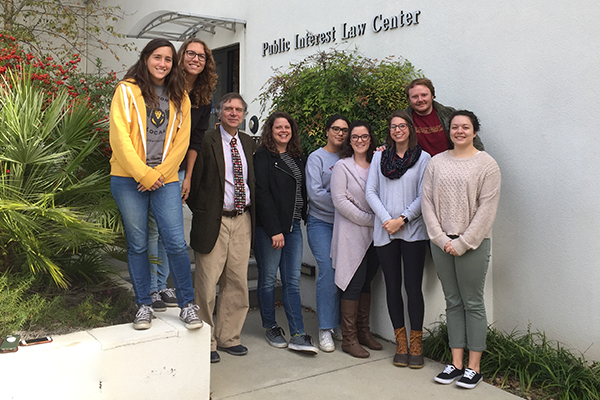
In the fall of 2018, the Children’s Advocacy Clinic (CAC) at the FSU College of Law Public Interest Law Center had a major breakthrough on one of its human trafficking cases. The CAC had been representing a child for about two years who had been a victim of commercial sexual exploitation of children (CSEC). She had been trafficked since at least age 15, by at least three different traffickers. Not only was she sexually exploited by the traffickers, she was completely dehumanized, deprived of food and not allowed to go outside.
CAC students had faced many of the difficulties inherent in advocating for CSEC kids, such as not being able to locate the child for significant amounts of time. Over the course of two years, CAC students worked with the child each time she was recovered from the traffickers. Each time the child was recovered, she had to readjust to the community while dealing with the effects of extensive trauma and being asked by law enforcement and the State Attorney’s Office to assist with their investigation and prosecution of the traffickers.
Another hurdle for the child was the delinquency system: she was facing sanctions for charges and violations of probation that were a direct result of her involvement in human trafficking. Each time she was recovered from the traffickers and sent home, her traffickers lured her away again, causing her to violate court-imposed sanctions. The State Attorney’s Office insisted that the child be sent to a secured facility, a locked-down Florida Department of Juvenile Justice (DJJ) program.
CAC students advocated against placing the child in a DJJ program. She is a survivor of human trafficking who desperately needed services and treatment, not punishment. CAC students consulted with experts in human trafficking to discover the best options for treatment for the child. A Safe Harbor Program, run by the Florida Department of Children and Families (DCF) and specifically designed to provide treatment for commercially sexually exploited children, was the best option. Locking her in a DJJ program that could not provide her the treatment she needed would be harmful to her, retraumatizing her on a daily basis. Despite initial opposition from the State Attorney’s Office and a lack of clarity about who would fund her treatment, CAC students won at her sentencing hearing.
Now, she is just the second child in the state of Florida to receive treatment in a Safe Harbor Program without first being involved in the DCF foster care system. She is doing well in treatment and CAC students continue to advocate on her behalf. The client has always loved animals and would like to work in a veterinary office one day. Fortunately, the Safe Harbor Program identified for her includes an on-site equine therapy program, providing specialized treatment as well as practical skills that the client hopes to apply in her future. While the location of her Safe Harbor Program is confidential, CAC students continue to monitor her progress in the program and were happy to recently receive a photo of the child smiling and grooming a horse.
The Children’s Advocacy Clinic at the FSU College of Law Public Interest Law Center is directed by Paolo Annino, Glass Professor of Public Interest Law, with support from Caitlyn Kio, Graduate Fellow.
